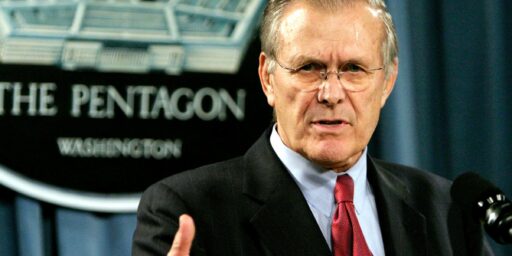On Rumsfeld
One of the most bizarre actions of the recent political season was the removal of Don Rumsfeld by the President this past Wednesday. The entire event was strange for a number of reasons.
1) The President lied. Yes, I know that that has been a popular refrain of the left for quite some time in regards to Iraq. However, in this case the evidence is incontrovertible: either he lied last week when he said that Rumsfeld was going to stay until the end of the term or he lied on Wednesday when he said that the move had been in the works for some time. Evidence suggests (see below) that he lied last week. Now, ultimately, it was of the “little white” variety, but it was still bizarre because it communicated a seeming stubborn reticence on the President’s part on this issue. In turn it made it seem as if he intended no visible changes on Iraq–a truly baffling move given the centrality of Iraq to the elections. It isn’t as if he had to give a definitive answer to the reporter’s question on Rumsfeld’s future. He could have equivocated, but he didn’t.
The whole situation from this perspective is surreal. It also reinforces the notion that the administration is out of touch.
2) The Elections. This can be broken down into three sub-issues:
- The “Information is Good” Issue: Going into an election, the public needs as much information as possible so as to make an informed decision. As such, there is an argument to be made that if such moves are known to policy-makers prior to an election, the public should be let in on the secret.
- The “Policy Responsiveness” Issue: Given that the public was clearly upset with the Iraq policy, surely it would have been a legitimate thing, in a democracy, for the White House to respond to those concerns.
- The “Strategery” of it all: There is the fact that given the policy responsiveness issue, that it would have helped the President’s party (potentially) in the elections. If one believes that one’s policy prescriptions are legitimate, it is wholly legitimate to try and win elections by making public policy adjustments, which is what this was. The notion (again, see below) that the President didn’t want to politicize this is absurd. It is a political move, by definition. Indeed, the war is political, by definition.
3) It was a Response to the Losses. There is the possibility that the timing of the announcement was in response to the losses on Tuesday either as an acquiescence to the political will of the voters, or as a sacrificial lamb. However, if that was the case, then some sort of admission in that regard (at least a paean to the notion that the administration had “heard” the voters) would have been useful.
4) The President Didn’t want Criticism? The notion that the President was trying to avoid criticism for a political move is laughable on its face. Every move every President makes is criticized somewhere as being political–especially when that President has approval ratings in the 30s. And since when did Bush do things to avoid criticism?
At any rate, all this is even weirder, because the decision to move Rumsfeld dates back, according to the NYT to the summer (Removal of Rumsfeld Dates Back to Summer):
President Bush was moving by late summer toward removing Donald H. Rumsfeld as defense secretary, people inside and outside the White House said Thursday. Weeks before Election Day, the essential question still open was when, not whether, to make the move.
Mr. Bush ultimately postponed action until after the election in part because of concern that to remove Mr. Rumsfeld earlier could be interpreted by critics as political opportunism or as ratifying their criticism of the White House war plan in the heart of the campaign, the White House insiders and outsiders said.
As noted above: I just don’t understand the logic. Further, since when did this White House (or, any White House) not see its moves as being political in some way?
In other Rumsfeldian news, his exit is pleasing to al Qaeda. This, no doubt, will cause great umbrage at Little Green Footballs and similarly oriented sites…





Ahhh, so that IS you, Dr Taylor!
I was reading the post, thought “That’s Steven Taylor”, then looked at my RSS reader and thought “no, its at OTB”. Now it makes sense.
Anyway, I agree with you on the Bush lied angle. I wonder if he was trying to look like “The Decider”, when he really wasn’t sure if he wanted to pull the trigger on Rumsfeld. In other words, he never admitted he was thinking about changing SECDEFs until he was absolutely sure.
Regardless, Rummy should have gone before the elections, and I’m sure that privately, many GOP congress members agree. Basically, Bush took something that could have helped them out and WAITED UNTIL AFTER IT COULD.
Steve,
The writing on the wall was written in the blood of American troops and Iraqi civilians. It was clear and easily understood. It read- Either send more troops or get us out.
Rumsfeld ignored his generals from the start and by allowing him to continue in office for as long as he did and waiting out the election to see if a decision needed to be made, our commander in chief yet again failed his responsibility to those who serve under him.
I see this as great politics. The President deprived the campaign with a lightening rod that would have allowed the Dems to focus their message on Iraq. Now, before they could utter a sentence as the controlling party of Congress, their first agenda item has been written for them. They will have to stake out a position to confirm the new SECDEF or they will have to rubber stamp him. More diabolically, every far left loon in Congress and the blogsphere will weigh in driving the Dems who hope to have a future in ’08 into damage control.
I believe the Dems got the message on Iraq wrong. The greater populace doesn’t want to abandon Iraq, they just wanted something changed to get on with the job. An attempt to force pull out prematurely will not increase the Dems standing but rather reveal there lack of fortitude.
The loss of Congress was really inevitable given all the scandals but it was also strategic. No more shouting into the wind for the Dems. They gained little real power but they will now have a legislative history come November 2008.
B,
There’s no escape.
Cian,
There is little doubt in my mind that the post-invasion policymaking on Iraq has been marked primarily by incompetence. The handling of the Rumsfeld situation only reinforces this notion.
I sometimes wonder what happened to a brain that produces such output?
Unfortunately for Bush, his party did a very good job of labeling any Democrat who called on Rumsfeld to resign as “Cut and Run”. This was central to the campaigns of many pro-Bush, pro-war candidates, so Bush himself couldn’t admit he was firing Rumsfeld without giving indirect support to the opposition.
Since Bush’s team is usually pretty good about circumventing sensitive issues, I’m guessing that last week’s question was unexpected, and W panicked. If it was expected, I would assume there would have been a better prepared response.
Talboito,
It would be appropriate for you to expand your remarks so we can see your point of view on this subject rather than insult the people who take the time to write their thoughts. It is a civil request made sincerely. We all have different opinions and come from different backgrounds but the burden is upon each of us to articulate those opinions as best we can rather than sink to low blows and childish remarks.
Thanks for your attention to this matter.
Perhaps Talboito’s patience was impaired by JKB’s detachment from (a) reality and (b) grammar. I mean, look at this:
They will have to stake out a position to confirm the new SECDEF or they will have to rubber stamp him.
What does that even *mean*?
Maybe Bush is running out of gas. The difficulty with the war may be exhausting him causing him to make political mistakes. I don’t think anyone really understands nominating Harriet Miers. The Rumsfeld resignation may be a further sign Bush isn’t as good a politician as we thought he was.
I have a different take. I think the President and Rumsfeld were planning on only a Dem House. They were planning on having Rumsfeld step down before (or as -best spin) the Dems went after him in the House.
After they knew they lost the Senate, maybe they are trying to head off a subpoena? I don’t know. But I do think that they were doing some contingency planning.
Anyway, I hope it spares America from a “time machine congress” that goes back and bitches and whines constantly about everyone not being a genius in the past. Got a feeling I’m being too optimistic.